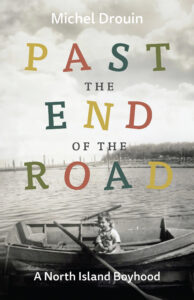Past the End of the Road: A North Island Boyhood is a new autobiography by Canadian septuagenarian Michel Drouin. Growing up in Port Hardy in the 1960s was clearly a whole different way of life than nearly anybody reading this newspaper is likely to have any inkling of. At the time, the immediate world consisted of trees, elk, bears, bees, racism, and guns. One anecdote at a time, Drouin attempts to sculpt the life of a wild boy, sneaking out at sunrise with his father’s rifle and a canoe, traversing the murky waters of the Pacific Ocean, and living what was once a common life but is now long extinct to all but the most dedicated bushwhackers or small-town folk.
The book is not a difficult read, and I imagine you could burn through it in a single afternoon if you committed to it, but it took me far longer because I felt adrift within its pages, and not in a lazy summer day way, either. This memoir eschews any other than the barest form of continuity to instead focus on a peppering of mostly unrelated or anticlimactic anecdotes experienced and underwent by Drouin. A great example of this is an encounter by a massive bear who confronts Drouin. While I don’t wish mishap on anyone, I could barely contain my excitement at this possibility of something finally happening. Yet, nothing did.
Before long the bear just wandered off. Sure, it’s an objective relief that a crisis was narrowly averted, but these sorts of non-starters happen so frequently that I began to wonder if I would eventually find myself reading an engaging story before the end of the book rolled around. As an ex-editor of a publication, Drouin shows a surprising lack of understanding of how to engage a reader. Many of the anecdotes are qualified by statements such as “or something”, and “I don’t remember.” The book has the cohesive qualities of an elderly man falling asleep in a rocking chair while telling a meandering story to his great-grandchildren, whose faces are glued to their Nintendo Switches.
For those who think I’m being too harsh, I could not help but think back fondly to the memoir The Forgotten Soldier by Guy Sajer, a French teenager unwittingly drafted into the Nazi army near the end of WWII and forced to witness the horrific tragedies of war. I was engaged from front to back because the stories were full of brilliant specificity, philosophical undertones, and an overarching narrative and temporal thread that drew the reader through its gripping and emotionally compelling story.
Past the End of the Road has likely succeeded as a product of nostalgia for the bygone culture of barely-civilized Vancouver Island, and I think Drouin’s family and peers may find this a charming collection of partially immortalized memories. Unfortunately, I doubt it will have widespread appeal due simply to its lack of ability to tell a cohesive story with a powerful narrative thread keeping everything on track and moving forward. This book does tread interminably toward a glorious eventuality, however, and that is the triumphant end of my insom… mni… a…

